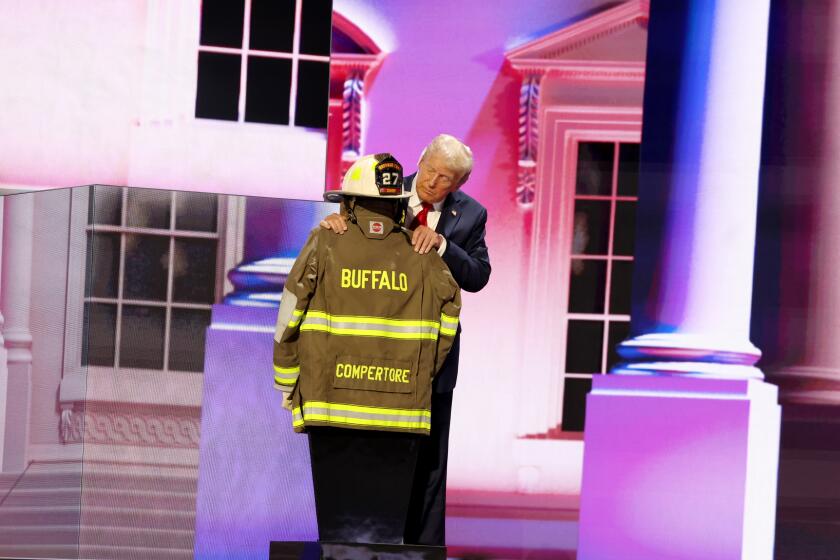Should doctor-patient confidentiality still apply when the patient is the president?

- Share via
In a typical presidential election year, voters might wonder how the candidates’ views stack up on issues such as abortion, tax cuts, gun rights and immigration policy.
But this year, as a 78-year-old Republican Party nominee campaigned to replace an 81-year-old Democratic incumbent, a different question rose to the forefront of many voters’ minds: What’s in their medical files?
That issue eclipsed all others after President Biden’s blundering performance in last month’s debate against Donald Trump, triggering widespread concern about Biden’s physical and cognitive health. It became even more salient after Trump sustained a gunshot wound to his ear and Biden came down with COVID-19.

When Biden withdrew from the presidential race Sunday, House Speaker Mike Johnson (R-La.) kept the health question alive by calling on the commander in chief to resign.
“If Joe Biden is not fit to run for President, he is not fit to serve as President,” Johnson wrote on the social media platform X.
Biden’s doctors have denied speculation that the president is being treated for Parkinson’s disease or another neurological disorder. Meanwhile, Trump’s campaign has released limited information about the former president’s condition after he was grazed by a rifle round.
Is the public entitled to know more than either man has willingly disclosed?
“In the ideal world, it would be great if there were full transparency,” said Dr. Robert Klitzman, a psychiatrist and bioethicist at Columbia University. But no patient — not even a president — should be forced to share medical information they’d rather keep between themselves and their doctor, he and other experts said.
The reason is simple: A successful relationship between a doctor and patient relies on trust, and that includes trusting a doctor to not share information that might be considered embarrassing, unflattering or stigmatizing.
“To be able to help a patient as much as possible, we need the whole story,” Klitzman said. “We need to know if the patient is depressed, if the patient can’t pee, if the patient’s in pain, if the patient is forgetting things. We need that information to make an accurate diagnosis and figure out the best treatment to help.”
Without the assurance of confidentiality, a president might well decide he’s better off steering clear of doctors altogether, said George Annas, a professor of health law, bioethics and human rights at Boston University.
“You want him to have access to whatever treatment there is, and he ain’t going to get it if he’s not going to get tested,” Annas said. “That’s why we keep this stuff confidential, and why it makes perfect sense to do it even though everything in you screams, ‘I want to know what’s the matter with him.’”
Though President Biden dismissed the suggestion, experts say having him take a cognitive exam has merit. Here’s how the tests work, and what they might tell us.
The principle of doctor-patient confidentiality goes back to ancient Greece and is enshrined in the Hippocratic oath: “Whatever I see or hear in the lives of my patients, whether in connection with my professional practice or not, which ought not to be spoken of outside, I will keep secret, as considering all such things to be private.”
About 2,400 years later, the notion that a patient’s medical information should remain private was codified into federal law as part of the Health Insurance Portability and Accountability Act of 1996, better known as HIPAA.
There are limited circumstances where doctors have a duty to disclose a certain amount of information about their patients.
For example, if a patient presents a danger to himself or others, a doctor has a duty to warn law enforcement or potential victims of the threat, said Dr. Bandy X. Lee, a forensic psychiatrist and educator in Harvard Medical School’s program on psychiatry and the law.
If a patient has a reportable sexually transmitted infection such as syphilis or HIV, that diagnosis must be shared with a public health department, along with the names of the patient’s past partners so they can be informed and get tested, Klitzman said.
And if doctors notice a spike in cancer cases among people clustered in a geographic area, that too is passed along for public health officials to investigate.
The shared view among the doctors who contacted me is that President Biden is not simply getting older; they believe he’s a man with a serious medical condition.
Beyond cases such as these, the consensus fades, Annas said.
Congress could try to carve out an exception to HIPAA and require presidents and presidential candidates to release their medical records to the public. But in the unlikely event that the law were to change, it’s unclear whether it would survive a challenge in court, said Bert A. Rockman, a professor emeritus of political science at Purdue University who specializes in the American presidency.
“It raises a lot of questions to which we don’t know the answers,” he said.
Besides, forcing sitting and would-be presidents to waive their right to doctor-patient confidentiality wouldn’t guarantee that voters learn the truth, Rockman said. A president could simply shop around for a doctor willing to obfuscate in a medical report, for instance.
“There are always going to be ways to get a work-around,” he said.
Even if a president is forthcoming, knowing their diagnosis wouldn’t necessarily tell you much about their ability to function. A White House occupant could have a mild case of Parkinson’s but be able to carry out the job just fine with proper treatment, Klitzman said.
Voters should also keep in mind that there’s a difference between the president and the presidency, Rockman said.
“The presidency can work even if the president is diminished,” he said. “In all likelihood, unless the president is completely out to lunch for some reason or another, either physically or mentally, the office itself functions.”
Trump describes the assassination attempt, saying he heard a ‘loud whizzing sound’ and then ‘felt something hit me really, really hard.’
Indeed, U.S. history is rife with examples of presidents concealing serious medical problems from the public.
John F. Kennedy was taking narcotic painkillers, amphetamines and steroids to treat his Addison’s disease and other ailments while trying to avert a nuclear crisis with the Soviet Union in the early 1960s.
Grover Cleveland said he was going on a four-day fishing trip when he boarded a yacht in 1893 to have a malignant tumor — along with part of his jaw and five teeth — surgically removed from the roof of his mouth.
Woodrow Wilson suffered a stroke in 1919 that left him partially paralyzed, bedridden and unable to feed himself for the remainder of his presidency. When pressed for details about Wilson’s condition, his doctor said “the President’s mind is not only clear but very active.”
It’s not OK to lie to preserve a patient’s privacy, Klitzman said, but that doesn’t necessarily mean a doctor must reveal “the truth, the whole truth, and nothing but the truth.”
“You can say, ‘The President’s not feeling well today,’ or you can say, ‘The President has COVID,’” he said. “You want people to trust the government, and if people feel the government is lying all the time and we can’t trust anything they say, that’s not good.”










